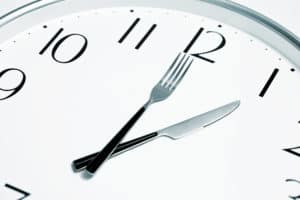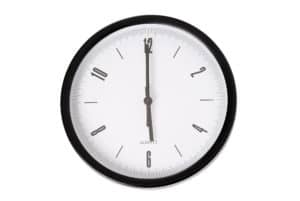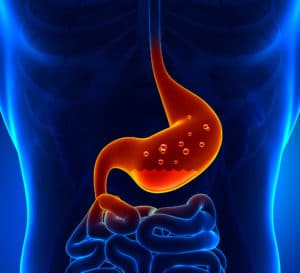When setting up your omad diet routine, you may often wonder:
What is the best time to eat one meal a day?
There are certainly advantages and disadvantages to each time throughout the day as you look to setup your omad diet for optimal success.
Let’s take a look at the pro’s and con’s to eating your one meal a day in the morning, afternoon, and evening.
Eating One Meal A Day in the Morning

Some people may choose to eat their omad diet meal in the morning due to work schedule, exercise, or many other reasons.
While this choice can be made for many reasons, there many things to keep in mind when choosing this earlier eating window.
Let’s take a look at the pro’s and con’s of eating your one meal a day in the morning.
Pros
Can Provide Energy For The Day
According to dietary professionals, the body “uses a lot of energy stores for growth and repair through the night,” which is why you often wake up feeling confused, upset, or even very hungry.
As a result, eating your one meal in the morning can be beneficial because it can help in replenishing your energy.
Just as importantly, dietitians also state that eating in the morning helps to create a more balanced level of energy throughout the day because your blood sugar is more stable.
This benefit can be significant because it may help with hunger later on throughout the day.
Increased Physical Activity

Eating in the morning is likely to increase your energy level and make exercise more comfortable.
These benefits occur because your body has the whole day to digest your food and can utilize the calories and nutrients.
For example, one expert said that “People who eat early in the day regularly often have increased physical activity.
They have better dietary profiles and lower intake of snacks.”
This benefit can help those who may struggle with not snacking throughout the day while on the omad diet.
Cons
Your Meal May Not Be As Enjoyable

Enjoying your one meal a day is crucial not only to your short term success, but long-term success as well.
Although you may be eating your one meal in the early morning, it may affect what kinds of foods that you choose.
Some people may feel entirely different in the early hours of the day than they do the latter hours.
Some may experience stomach discomfort or an upset stomach in the early morning hours.
The stomach is usually more acidic in the morning, which can contribute to this issue.
This can affect your appetite as well as your meal choices.
Unfortunately, studies have also shown that many people don’t like eating early in the morning.
You May Not Eat As Much

One of the toughest parts about eating your meal during the morning is that you might struggle to eat the amount of food that you need.
This problem is somewhat related to the issues above but has other complications.
As a result, you may find it difficult to sustain a morning eating window and may end up moving it later and later in the day.
Eating One Meal A Day in the Afternoon

Eating your one meal in the afternoon is a popular choice for many people who work regular office hours throughout the day.
But, there are many things to be aware of when choosing this eating window.
Let’s take a look at the pro’s and con’s of eating your one meal a day in the afternoon.
Pros
Can Fit Most Work Schedules
 For most people, they are able to get some time in the afternoon hours for a break from their duties.
For most people, they are able to get some time in the afternoon hours for a break from their duties.
This can be an ideal time to have their one meal a day while also getting some relaxing time away from work.
This can be beneficial as it allows you to not have to adjust your daily social schedule around your omad meal.
May Improve Work Ability

People who eat their one meal during the afternoon may be doing their work an excellent service by enhancing their performance and improving their ability to focus.
This result has been noted in multiple studies, particularly those focusing on younger children.
For example, one study found that children who had a free lunch program in their school had reading test scores that were 18 percent higher and math scores nine percent higher than students who did not have access to free lunch.
In another study that focused more on the benefits of eating in the afternoon, it was found that people who stepped away from their desk for a meal break performed better than those who did not.
The study found that an afternoon meal helped people rest from their work, collect their thoughts, and alleviate much of their anxiety.
Cons
May Cause a Feeling of Drowsiness

Although people may work more effectively and get a surge of energy if they eat their one meal during the afternoon, they may also feel a sense of drowsiness after eating.
This problem occurs based on your blood sugar level.
If your level gets too high or too low – i.e., if you eat too much or too little – your body is likely to feel sleepy and can affect your overall performance while you are at work.
This drowsiness depends partially on how much food you eat and when you woke up in the morning.
Some people naturally wake up a bit later and won’t feel their afternoon fatigue until later in the day.
If you consume too much food during your one meal, you’re more likely to end up suffering from this drowsiness.
Lower Sociability

While the afternoon hours at work can be a great time to go out with others and interact, you probably won’t have that much free time when you’re eating one meal a day.
Instead, you’re going to have to focus on carefully preparing and eating your meal, which is likely to take most of your break.
As a result, you’re not as likely to spend much time with your co-workers and may miss out on other workplace activities that typically occur during a lunch break.
Unfortunately, this means that your break may end up being more stressful for you than if you cooked and ate your meal earlier or later in the day.
Eating One Meal A Day in the Evening

Eating your one meal a day in the evening is a very popular choice among many people on the omad diet.
Pros
The Fight or Flight System
During the day, our bodies utilize what is known as the sympathetic nervous system or the “fight or flight” system.
This part of our nervous system helps to keep track of dangers and stress throughout the day and adjusts your body as problems occur.
Typically, this element of your body is most active during the early morning.
This reaction is due to the stresses of the early cavemen – the morning often found them having to find food or defend themselves against invaders.
As a result, your body’s level of cortisol – the stress hormone – is typically highest during the earliest part of the day, often during about eight in the morning.
During the later part of the day, your body’s stress starts to decrease as your cortisol levels drop.
In a sense, your body is winding down and preparing to sleep.
At this point, the parasympathetic system activates.
This system lets you sleep more comfortably and digests your food more effectively.
And this is a significant benefit because it lets you truly enjoy your food and digest it most effectively at the same time.
This advantage is a great reason why eating your one meal is a good idea in the evening.
Allows More Sociability

Eating during the morning and the afternoon is often a private situation that can limit your chances at social engagement.
However, by scheduling your eating window in the evening hours, you are most likely to be available to share your meal with friends and family.
The family dinner table can act as unifier for many families. By sharing your meal with others, you can catch up and talk about your everyday activities, events, or share stories.
A study that was conducted by the National Center on Addiction and Substance Abuse at Columbia University showed positive results for children that eat with their families.
It showed that children who eat dinner as a family five or more days a week were less likely to have trouble with alcohol or drugs, ate healthier, and showed overall better academic performance in school.
They also reported that they felt closer to their parents and family.
Cons
You May Overeat
 Many researchers have found that in the evening hours we are likely to experience alterations in hormone levels that will influence appetite, causing us to overeat.
Many researchers have found that in the evening hours we are likely to experience alterations in hormone levels that will influence appetite, causing us to overeat.
They also found that stress throughout the day is likely to induce binge eating in the evening hours.
The study — conducted by researchers from the Johns Hopkins School of Medicine in Baltimore, MD, and the Mount Sinai Icahn School of Medicine in New York City, NY — was recently published in the International Journal of Obesity
The overall goal of this research was to determine how the time of day affects appetite, and whether stress might play a role.
“Eating late in the day is common, and stress can induce eating,” the researchers report. “Little is understood about how time of day and stress interact to affect appetite and thereby body weight. These may be particularly important influences in binge eaters, who tend to binge in the evening, and in response to stress.”
Potential for HeartBurn Or Acid Reflux

Late-night eating – particularly just before you go to bed – may cause a few issues for some people.
Some people might suffer from various health conditions if they go to bed too soon after they eat, which can be a major issue for many people with other health issues.
In a 2005 study of 350 people, it was found that eating within 3 hours of bedtime was linked with increased risk of developing acid reflux symptoms as well as heartburn
While eating later in the evening may cause heartburn for some people, it may also cause other issues that are hard to tolerate.
For example, studies have shown that people who eat later at night are at a higher risk of cardiometabolic diseases.
These diseases affect how well your metabolism works and could cause complications with the ways that you digest food.
Some people might even develop problems like Crohn’s or other serious digestive issues.
In one study, it was found that even a 200 calorie snack consumed in the evening would raise a person’s cholesterol more than if they ate it during the day and increase their chances of other health issues.
Conclusion
As you can see there pro’s and con’s to whatever eating window that you may choose when setting up your omad diet.
One of the luxuries of the omad diet is the ability to choose your own eating window.
For some, eating in the afternoon may work best for them. Some may elect to always eat their one meal a day in the evening. Some people like to eat later in the day or at night because they find it’s what works best for their schedule.
Make your 4-hour eating window decision based on your lifestyle and not what others think it should be.




